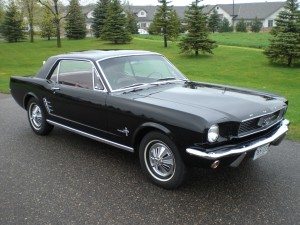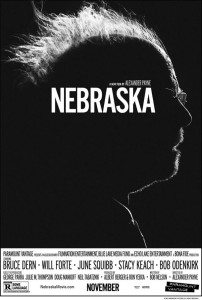Imagine you built a replica of, say, a ’65 Ford Mustang. Looks exactly like the real thing. Maybe you used metal, maybe wood, maybe plastic; doesn’t matter. Down to every visible detail, it’s a Mustang back when Mustangs were the coolest cars in the world. You can even sit in it and listen to the radio. And if you get it rolling down a hill, it’s like you’re really driving! The steering wheel even works. No brakes, though. With luck that hill flattens out eventually.
But look under the hood, and while maybe you went to the trouble of making a replica engine, you used an intricate matrix of toothpicks to do it. In short, it’s not a real car. Take a pocket knife to it, you can carve chunks out of it. Take it to a carwash and all the paint washes off. It looks like a Mustang, but it’s not a Mustang. It’s a representation of a Mustang. It signals the thing but it is not the thing. It is an empty shell.
In the past week I watched three very different movies. Different but for one thing. Each one is a fake Mustang. Each represents a specific genre, each includes the signifiers required by their respective genres, and each, when we look under their hoods, have engines made of toothpicks.
Nebraska, the latest from Alexander Payne, who’s made a string of excellent movies (Citizen Ruth, Election, About Schmidt, and, to a lesser degree, Sideways) and one limp turd (The Descendents), tells the story of an old man, Woody Grant (Bruce Dern), possibly touched in the head, who thinks a scam letter telling him he’s won a million dollars is real. He lives in Montana and starts walking to Nebraska to pick up his winnings.
His shrill wife thinks he’s nuts. One of his sons agrees, but the other one sees his father’s pain, his need for something to hold onto, and agrees to drive him to Nebraska. Along the way, they stop in Woody’s hometown long enough for an impromptu family reunion.
In case it’s not clear enough what movie it is we’re watching, Payne chose to shoot it in black & white. Truly, it is now an “indie movie,” specifically a road movie indie movie, even more specifically, an old-coot-who-may-or-may-not-be-crazy-goes-on-the-road-and-teaches-the-rest-of-us-an-important-life-lesson-indie-movie, with a bonus family-reunion angle wedged in the middle.
To be clear, I’m talking about the genre of “indie movie.” I’m not talking about the actual production. The movie was made by Paramount for about $12 million. But “indie movie” is a genre, and Nebraska fits it to a tee.
There are no unique characters in Nebraska. Only symbols of characters. The taciturn old man. The son who’s girlfriend left him and whose job sucks, who in taking his dad on this crazy drive will learn an important life lesson. The mother who yells and swears her way into our hearts with her frank sex talk. The two fat cousins who say dumb stuff. The old hometown antagonist whose toothless threats add a tiny bit of tension. The other brother who doesn’t get the whole this-crazy-mission-of-dad’s-will-teach-us-important-life-lessons, who exists in the movie for no other reason than to not get it. The low-key ending in which life is celebrated, but in such a small way you almost don’t notice it happening.
Except, paradoxically, you do notice. Its understatement is screaming in your face. You see, Woody doesn’t need a million dollars. He just wants a new truck and a compressor. After they reach Nebraska, and Woody learns he didn’t win anything, his son, David (Will Forte), trades in his own car for a used truck and buys Woody a compressor. He lets Woody drive the truck briefly through his old hometown, just long enough for a few key people to see him. Roll credits as the truck cruises down a lonely two lane highway.
David learns that it’s not about money. It’s about doing something for the ones you love. Which, actually, he knows at the start of the movie. It’s why he drives his dad to begin with. He tells people this. He seems to be exactly the same from beginning to end. In fact so does everyone else. Woody remains essentially inscrutable throughout. David learns a few tidbits about dad’s past–an old girlfriend, a war injury, an affair–but it all feels like clichéd window dressing. Thanks to Dern, Woody is compelling on the surface–but surface is all we get.
The movie isn’t boring, yet it has no forward momentum. We’re told the meaning from the outset. Literally, vocally, by David. Visually by director Payne. We’re given the outlines of a movie in place of an actual movie. None of it rings true. Instead of trying to capture a certain type of life, the movie aims to capture a type of movie that captures a certain type of life. With a few missteps (e.g. the fat, dumb, caricatured cousins), Payne and screenwriter Bob Nelson have captured just that: an old coot indie road movie. It looks nice. It’s got a few laughs. Bruce Dern is as always a pleasure to watch. But that’s exactly as deep as it goes.
Nebraska can’t help but bring to mind David Lynch’s brilliant, G-rated old coot road movie, The Straight Story, in which old man Richard Farnsworth drives a lawn-mower across a few midwestern states to visit his estranged brother. When Nebraska dreams, it dreams of being The Straight Story.
Only God Forgives, the latest from director Nicolas Winding Refn and star Ryan Gosling (who made Drive a couple years ago), also wishes it were a David Lynch film, albeit the R-rated kind. The movie is dedicated to Alejandro Jodorowsky, but I’d say it owes a far larger debt to Twin Peaks, Blue Velvet, and Mulholland Drive.
Set in Bangkok, the story is simple: Gosling plays Julian, a drug dealer. His psycho brother, Billy, murders an underage prostitute. Lieutenant Chang allows the girl’s father to kill Billy, then cuts off the father’s hand. After all, dad allowed his girl to be a whore. Julian and Billy’s even more psychotic mother shows up (Kristen Scott Thomas) and has the father killed. Then she puts out a hit on Chang. It goes south. Chang seeks revenge.
That’s it. It’s shot with insanely deep and gorgeous colors. Every shot is carefully framed. The mood is dreamy and surreal. Chang becomes a kind of avenging angel of justice. His scenes of slicing up perceived evil-doers are followed by him singing Thai karaoke songs to his underlings. He never uses a gun, only a sword. Gosling speaks maybe twenty words total. He doesn’t do much, but imagines various sexual and violent acts. We don’t always know what he’s imagining and what’s real. The murders in the movie are gory and over-the-top.
Abstract, dream-like movies with beautiful, thoughtful visuals are often ones I love. The problem with Only God Forgives is that it’s a fake Mustang. Watching one of Lynch’s movies, you feel like he’s stolen your dreams. It’s like he’s tapped into some kind of inner universal archetype of fear and desire and visualized it on-screen. Refn’s movie is empty below the surface. It certainly looks like the kind of movie where what’s important is only suggested, where a greater, unspoken truth lies below the glittering surface. But such a truth is nowhere to be found. The movie is nothing but the plot description above. It’s not exactly boring. It’s nice to look at. And that’s it.
The plot of The Hunger Games: Catching Fire is the same as in the first movie in the series: tough girl reluctantly goes to big city to fight in games against other kids. Catching Fire exists in a different realm than Nebraska and Only God Fogives. It cost hundreds of millions to make and market, and will earn close to $1 billion worldwide in theaters alone. Yet it too is a fake Mustang (read the Evil Genius’s opposing opinion here).
Its genre is oppressive-science-fiction-future-world, although its world is so thinly imagined it would be more accurately called fantasy. Which already this is an interesting point, I think. Why not call it fantasy? Because it mimics a specific science fiction genre. Its failure to make its ostensible science fiction world in any way believeable is what turns it into fantasy. It’s fantasy by accident.
Its characters are all types. There’s the dictator, Snow, played by Donald Sutherland, whose every line might as well be “Mwa-ha-ha-ha!” The savvy game designer who, I don’t know, might turn out to be not who he claims, Plutarch Heavensbee (seriously?), played by Philip Seymour Hoffman (whose presence one wants to be exicited by, but his dialogue—egads! His scenes with Sutherland are like watching two great actors making fart noises at each other for all the sense they make). The ex-winner, now an alcoholic, Haymitch (Woody Harrelson). The dopey potential boyfriend (DPB). The other, dopey in a different way, potential boyfriend. And of course our heroine, Katniss Everdeen (Jennifer Lawrence), reluctant teen savior.
Katniss is a strangely uncompelling character. Reluctant hero is a standard type, yet her reluctance is inconsistent and ultimately kind of awful. In something like, say, The Road Warrior, Max is a loner and a survivor. He wants to save his own skin and that’s it. Only when he’s next to death does he decide that helping others might be a worthwhile endeavor.
Whereas Katniss is more than willing to die from the start. But only in the interest of saving her DPB Peeta. As for the larger rebellion her defiant example has spurred, she doesn’t care at all. In fact she wants to run away into to the woods with her other DPB, only he won’t do it, instead choosing to help everyone in the world not be brutally murdered. Katniss reluctantly comes along.
So she’ll die for one dope, but not for the chance to save everyone? She’s selfless in the case of her DPB, but not in the case of anyone—everyone—else? In the end, it’s revealed that just about everyone in the whole movie has been working to aid the rebellion by keeping Katniss alive. They couldn’t tell her because if they had, she’d have screwed everything up. We in the audience have to agree. Katniss is selfish and blind.
Which as far as teen realism goes, such muddled goals are, arguably, realistic. The problem is the context the movie places Katniss’s schizophrenic character in. The context is this future world of oppression, and the movie doesn’t care about it in the least. In real life, a teen’s rebellion against leaving home and joining the adult world is serious for the teen, but not so serious that failing to grow up will cause the deaths of millions. Katniss’s angst will do just that. She comes across as selfish, blind, and horrible. She signifies the reluctant hero without being in any way heroic, and with her reluctance not making any sense in the larger scope of the story.
Not even the hunger games themselves are taken seriously. As in the first movie, they play like an afterthought. There’s little in the way of kids outsmarting and killing other kids. Mostly it’s killer monkeys, lightning strikes, and a deadly fog. Which fog Katniss stares at until it reaches her, then sticks her hand into. Oops! It’s deadly poison! Did she not see the first movie? She’s in an artificial gamescape where everything is designed to kill her, but she thinks maybe a natural, soothing fog has arisen to disgorge helper faeries?
Of these three movies, I found Catching Fire to be by far the worst. It’s long, boring, and visually bland. It’s hard to even judge the acting. The dialogue is crippling in its stupidity. Lawrence is reduced to making faces, crying, and yelling in an attempt to signify emotional states. Worst of all is that it’s a fake. Catching Fire plays on the one hand at being a science-fiction allegory, and on the other as a story of a teen facing adult responsibilities, without taking either one seriously, and without providing any depth of thought behind its glossy surface. It’s got toothpicks under its hood.















Nebraska was an American mood. You wanted it to be something else, that which you might describe as “something more,” but that’s judging it for what it isn’t instead of for what it is.
I’m not sure why you’re comparing it to Lynch. To me, a more apt comparison would be to Jarmusch—Stranger Than Paradise, maybe. A film about character and characters.
I thought the black & white served to highlight just how bland that world was. There was very little of the high-contrast stuff you would expect; everything was dull and grey and painfully normal. Very un-quaint. I liked that. I don’t think Payne shot that way to mimic the indie look, but because he wanted that ubiquitous grey.
I didn’t adore it or anything, but felt it was kindred to About Schmidt and not to the Descendants. There’s no big lesson because you already know the lesson. All you have to do is stop fighting the acceptance of it. That reflects something in me and so I left with things to consider, and satisfied.
As to Catching Fire, you seem to dislike it for the very reason that most people love it: that Katniss Everdeen is a different sort of protagonist. You’re right, she isn’t the reluctant hero. Because it’s not a story about saving the world at all. It’s a story about her and her failings and strengths, which are frequently the same things.
Saving the world is impossible, anyway. I know. I remember the third book.
Um, no. I don’t “want” Payne to make a certain kind of movie, nor anyone else. Just like you, I watch a movie, and then I think about why I had the reaction to it that I did. All I “want” a movie to be is non-crappy.
Nebraska is exactly unlike a Jarmusch movie, for exactly the reasons I stated. Jarmusch creates UNIQUE characters who feel real. Because they are unique, they do surprising things. They drive the stories forward in unexpected ways. How could it be otherwise? They’re unique people.
Nebraska is peopled by cliches adhering to formula. No one does anything based on character. They only act in the way their “types” act in this kind of movie. It is entirely formulaic. That is why I found it empty. And by “empty” I don’t mean the lack of some big profound message. I mean empty the way Down By Law doesn’t feel empty. No giant lessons are learned there either. But you feel like you’ve seen something with meaning.
And of course Payne isn’t thinking “I wanna make an indie movie, I’ll shoot in b&w!” He read a script that he pictured in b&w. And no wonder. It’s that type of movie.
You two….